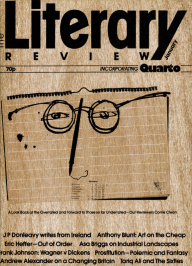George Szirtes
Disapprove If You Dare
Collected Poems 1963-1980
By Geoffrey Grigson
Allison & Busby 231pp £9.95
Blessings, Kicks and Curses
By Geoffrey Grigson
Allison & Busby 279pp £9.95
The Private Art: A Poetry Notebook
By Geoffrey Grigson
Allison & Busby 231pp £9.95
‘I am not one to say no to a blessing’ says Geoffrey Grigson in his poem on the burial of Auden, ‘Occasion in Westminster Abbey’. Yet the title of his recently collected essays and reviews, Blessings, Kicks and Curses shows that blessings are but part of his experience; the kicks and curses come as naturally. Indeed one might in a facetious mood see Grigson as some gouty and splenetic retired military man living in the country, who is regularly seized by black moods in which he mutters up the garden looking for disgusting things to stamp on. Edith Sitwell for instance: ‘no interior light even of that coldest luminescent kind.’ Dylan Thomas: ‘a stale sentimentalism of language ... always the inferior choice ... a provincial of poetry.’ Gertrude Stein: ‘an ectoparasite’, Michael Holroyd’s Augustus John: ‘toadying’. Or more generally and more regularly, incompetent modern poets: ‘idle ...off our own muckheaps’, academics and university poets: ‘short lived, fish-finger packets precisely with a sub-bourgeois taste of cod, flour, bread crumbs and batter.’ These images of physical disgust imply that the kind of people he dislikes are actually some form of sickness so abhorrent that if the body poetic is to survive at all it must vomit them up. Grigson commends a purgative. If it seems to us that on occasion the medicine is nastier than the condition warrants, that is not to say that the physician’s diagnosis is wrong or that his ideal of health is undesirable.
After all, Grigson’s Blessings more than compensate for his Kicks and Curses. Those who are kicked or cursed can look to their consciences and if they find naught there lacking they can dismiss Grigson’s abhorrence as the petulance of a querulous man, a man to whom irritation is second nature.

Sign Up to our newsletter
Receive free articles, highlights from the archive, news, details of prizes, and much more.@Lit_Review
Follow Literary Review on Twitter
Twitter Feed
Under its longest-serving editor, Graydon Carter, Vanity Fair was that rare thing – a New York society magazine that published serious journalism.
@PeterPeteryork looks at what Carter got right.
Peter York - Deluxe Editions
Peter York: Deluxe Editions - When the Going Was Good: An Editor’s Adventures During the Last Golden Age of Magazines by Graydon Carter
literaryreview.co.uk
Henry James returned to America in 1904 with three objectives: to see his brother William, to deliver a series of lectures on Balzac, and to gather material for a pair of books about modern America.
Peter Rose follows James out west.
Peter Rose - The Restless Analyst
Peter Rose: The Restless Analyst - Henry James Comes Home: Rediscovering America in the Gilded Age by Peter Brooks...
literaryreview.co.uk
Vladimir Putin served his apprenticeship in the KGB toward the end of the Cold War, a period during which Western societies were infiltrated by so-called 'illegals'.
Piers Brendon examines how the culture of Soviet spycraft shaped his thinking.
Piers Brendon - Tinker, Tailor, Sleeper, Troll
Piers Brendon: Tinker, Tailor, Sleeper, Troll - The Illegals: Russia’s Most Audacious Spies and the Plot to Infiltrate the West by Shaun Walker
literaryreview.co.uk